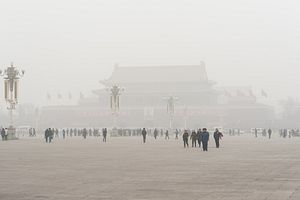Although Chinese leaders have placed environmental protection and clean-up efforts at the top of their agenda, China’s own Ministry of Environmental Protection (MEP) cast doubts this week upon the effectiveness of steps taken so far. A report issued by the MEP [Chinese] found that, in 2013, only three of 74 cities were able to meet China’s new air quality standards.
The MEP also found that pollution was most severe in the Beijing-Tianjin-Hebei area. The 13 cities in this region accounted for 11 of China’s 20 most polluted cities, and seven of the top ten. The average amount of PM2.5 pollution among the cities in this region was 106 micrograms per cubic meter—over ten times the World Health Organization’s recommended standard of 10 micrograms per cubic meter for an annual mean.
Based on the report’s analysis, the MEP concluded that China’s air pollution situation is “extremely severe.” An unidentified MEP official told 21st Century News [Chinese] that there were four reasons for the problem: high energy consumption, excessively rapid development of high-polluting heavy industry, and unacceptably high proportions and concentrations of air pollution (with the latter due in part to below-average wind speeds and precipitation in northern China in 2013). The official warned that China’s air pollution levels have “long exceeded environmental capacity” and that an increased pace of urbanization has only exacerbated the problem.
In an attempt to tackle the problem at the root, the MEP announced that it will undertake a large-scale, standardized research effort to identify the sources of air pollution (especially PM2.5). According to MEP official Zhu Jianping, this will be the first national undertaking to determine major causes of pollution. Before, each city had performed the research separately.
Though China’s leaders have repeatedly expressed their commitment to resolving pollution issues, the MEP’s report shows that promoting urbanization (also a key goal, especially of Premier Li Keqiang) is at odds with the goal of reducing pollution. Since urbanization is also seen as a crucial aspect of rebalancing China’s economy by increasing domestic consumption, it will be difficult for leaders to slow the rate of urbanization, even if doing so could help clean up China’s air.
And it’s becoming increasingly clear that air pollution has real world consequences for China. For one thing, the perceptions problems resulting from China’s pollution are beginning to negatively affect business development. The Beijinger noted that the American Chamber of Commerce in China’s annual Business Climate Survey revealed a sharp increase over the past few years in businesses that are having trouble recruiting or retaining talent because of China’s air pollution. 48 percent of businesses said they experienced such problems, up from a mere 19 percent in 2010. For many foreigners, China (especially Beijing) is becoming synonymous with pollution. Even U.S. movie star Samuel L. Jackson, who is visiting Beijing, wasted no time posting a photo of the smog from his hotel room with the caption “Even w/ lights, you can only see 2 ½ blocks… maybe!”
Yet the actual health consequences of breathing polluted air are far worse than any perception problem. The WHO recently estimated that air pollution exposure resulted in around 7 million deaths in 2012—accounting for one out of every eight deaths worldwide. Based on that estimate, the WHO labeled air pollution “the world’s largest single environmental health risk.” The WHO also pointed out that the area suffering most from air pollution is Southeast Asia and the Western Pacific. This region accounted for a staggering 5.9 million of the 7 million deaths from air pollution.
































